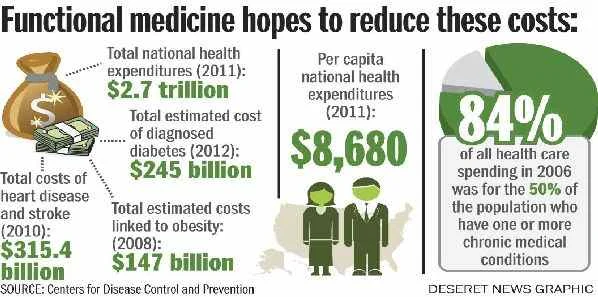The Cleveland Clinic (Cleveland, OH, USA) formally opened its Center for Functional Medicine (CFM) on 23 September 2014, making it the first large institution to offer the functional medicine model to its patients.
CFM has its own staff composed of four physicians, a nutritionist and a health coach. Leading the team is Dr. Mark Hyman, a pioneer in functional medicine who founded the UltraWellness Center in Lenox, Massachusetts. Functional medicine doctors like Hyman take a different approach to treating chronic diseases like diabetes, obesity and heart disease. Instead of soothing the symptoms, they try to identify and eradicate the root cause of the problem through a holistic approach in treatment.
At CFM, the physician, nutritionist and health coach work with the patient to devise a care plan that includes dietary advice. “We take a team approach and we believe that food is medicine,” Dr. Hyman pointed out. The patient starts on the plan and follows up with a health coach.
Creating Better Function in the Body by Restoring Balance
The objective is to create better function in the body by restoring balance, Dr. Hyman said. When the body can balance itself, symptoms disappear and medication becomes unnecessary. To get there, the team will create a plan that could include some combination of healthy foods, exercise and sleep while removing junk food, stress, alcohol, tobacco and anything else that tends to throw a body out of balance.
CFM's healthcare professionals, with decades of study and dozens of academic degrees between them, work toward a common goal: getting good stuff into the body and bad stuff out. “Like Einstein said, make things as simple as you can and no simpler,” Dr. Hyman said.
The practice of functional medicine simplifies the experience for the many patients who already have many doctors. For example, a patient has a doctor for high blood pressure, another for migraines and a third for that annoying skin condition. Often, the patient is responsible for keeping track of which doctor is advising what.
Avoiding the Common Practice of Dividing the Patient by Body Part
The CFM team takes the role of coordinating care and avoids the common practice of dividing the patient by body part: heart doctors looking at the heart, brain doctors looking at the brain and a skin doctor looking at the outside.
“The diagnosis and treatment model is different,” Dr. Hyman explained. “Say a patient comes in with psoriasis. The root cause might be something the patient’s eating.”
The usual practice is for the patient to go to a dermatologist, not to a gastroenterologist. The patient might be prescribed lotions or topical creams that soothe the skin without curing the condition. In contrast, a functional medicine team would strive to prescribe a cure: a different diet, in this instance.
The origins of disease can be found “in the interrelationship between environment and lifestyle and how those interact with a person’s genetic disposition,” according to Dr. Jeffrey Bland, who is considered the father of functional medicine. Bland, co-author with Hyman of "The Disease Delusion," started the Institute for Functional Medicine in 1991.
Functional Medicine Doctors Look at the Whole Picture
A person’s genes may make him susceptible to certain conditions and then the decisions he makes — choices about food, exercise, and workplace — can push him closer to or further away from developing symptoms, Dr. Bland said. With functional medicine, physicians look at the whole picture and create a plan to move someone away from symptoms.
“It’s different from the model that says, ‘here’s a pill for every ill,’” Dr. Bland noted. “It’s a systems approach to biology.”
Functional medicine doctors are deciphering the links between environment and lifestyle choices and noncommunicable diseases, like asthma, diabetes, and heart disease. Given that lifestyle choices are a piece of the problem, functional medicine doctors can share information and advise patients on actions that patients can take themselves. At the same time, the information can be shared widely, by patients and doctors alike. “The Internet democratises information,” Dr. Bland said.
Source: DeseretNews.com
Image Credit: DeseretNews.com
CFM has its own staff composed of four physicians, a nutritionist and a health coach. Leading the team is Dr. Mark Hyman, a pioneer in functional medicine who founded the UltraWellness Center in Lenox, Massachusetts. Functional medicine doctors like Hyman take a different approach to treating chronic diseases like diabetes, obesity and heart disease. Instead of soothing the symptoms, they try to identify and eradicate the root cause of the problem through a holistic approach in treatment.
At CFM, the physician, nutritionist and health coach work with the patient to devise a care plan that includes dietary advice. “We take a team approach and we believe that food is medicine,” Dr. Hyman pointed out. The patient starts on the plan and follows up with a health coach.
Creating Better Function in the Body by Restoring Balance
The objective is to create better function in the body by restoring balance, Dr. Hyman said. When the body can balance itself, symptoms disappear and medication becomes unnecessary. To get there, the team will create a plan that could include some combination of healthy foods, exercise and sleep while removing junk food, stress, alcohol, tobacco and anything else that tends to throw a body out of balance.
CFM's healthcare professionals, with decades of study and dozens of academic degrees between them, work toward a common goal: getting good stuff into the body and bad stuff out. “Like Einstein said, make things as simple as you can and no simpler,” Dr. Hyman said.
The practice of functional medicine simplifies the experience for the many patients who already have many doctors. For example, a patient has a doctor for high blood pressure, another for migraines and a third for that annoying skin condition. Often, the patient is responsible for keeping track of which doctor is advising what.
Avoiding the Common Practice of Dividing the Patient by Body Part
The CFM team takes the role of coordinating care and avoids the common practice of dividing the patient by body part: heart doctors looking at the heart, brain doctors looking at the brain and a skin doctor looking at the outside.
“The diagnosis and treatment model is different,” Dr. Hyman explained. “Say a patient comes in with psoriasis. The root cause might be something the patient’s eating.”
The usual practice is for the patient to go to a dermatologist, not to a gastroenterologist. The patient might be prescribed lotions or topical creams that soothe the skin without curing the condition. In contrast, a functional medicine team would strive to prescribe a cure: a different diet, in this instance.
The origins of disease can be found “in the interrelationship between environment and lifestyle and how those interact with a person’s genetic disposition,” according to Dr. Jeffrey Bland, who is considered the father of functional medicine. Bland, co-author with Hyman of "The Disease Delusion," started the Institute for Functional Medicine in 1991.
Functional Medicine Doctors Look at the Whole Picture
A person’s genes may make him susceptible to certain conditions and then the decisions he makes — choices about food, exercise, and workplace — can push him closer to or further away from developing symptoms, Dr. Bland said. With functional medicine, physicians look at the whole picture and create a plan to move someone away from symptoms.
“It’s different from the model that says, ‘here’s a pill for every ill,’” Dr. Bland noted. “It’s a systems approach to biology.”
Functional medicine doctors are deciphering the links between environment and lifestyle choices and noncommunicable diseases, like asthma, diabetes, and heart disease. Given that lifestyle choices are a piece of the problem, functional medicine doctors can share information and advise patients on actions that patients can take themselves. At the same time, the information can be shared widely, by patients and doctors alike. “The Internet democratises information,” Dr. Bland said.
Source: DeseretNews.com
Image Credit: DeseretNews.com
Latest Articles
genes, lifestyle, chronic diseases, functional medicine, holistic
The Cleveland Clinic (Cleveland, OH, USA) formally opened its Center for Functional Medicine (CFM) on 23 September 2014, making it the first large institut...










